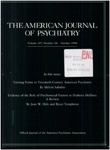The role of polysomnography in the differential diagnosis of chronic insomnia
Abstract
The authors examined the accuracy of the differential diagnosis of chronic insomnia with and without sleep laboratory studies in a consecutive series of 123 patients. All patients were evaluated by means of a sleep/wake log, a sleep habits questionnaire, structured psychiatric and clinical interviews, and a minimum of two consecutive nights of polysomnography. Notwithstanding a high rate of Research Diagnostic Criteria (RDC)-diagnosed psychopathology (63%) in this sample, the major finding was that in 49% of the patients laboratory results added to, refuted, and/or failed to support the clinical impression. This resulted in substantial modification of the initial diagnostic formulation and therefore in increased specificity of diagnosis.
Access content
To read the fulltext, please use one of the options below to sign in or purchase access.- Personal login
- Institutional Login
- Sign in via OpenAthens
- Register for access
-
Please login/register if you wish to pair your device and check access availability.
Not a subscriber?
PsychiatryOnline subscription options offer access to the DSM-5 library, books, journals, CME, and patient resources. This all-in-one virtual library provides psychiatrists and mental health professionals with key resources for diagnosis, treatment, research, and professional development.
Need more help? PsychiatryOnline Customer Service may be reached by emailing [email protected] or by calling 800-368-5777 (in the U.S.) or 703-907-7322 (outside the U.S.).



